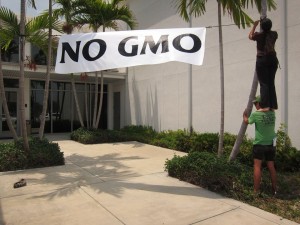 The USDA recently completed a comment period calling for public input on their plans to revise existing regulations regarding genetically engineered (GE) organisms. It appears this rule making procedure change is in part to facilitate the release of new GMOs into the environment, with emphasis on new rules involving:
The USDA recently completed a comment period calling for public input on their plans to revise existing regulations regarding genetically engineered (GE) organisms. It appears this rule making procedure change is in part to facilitate the release of new GMOs into the environment, with emphasis on new rules involving:
“Elimination of the notification procedure–a streamlined procedure for authorizing the importation, interstate movement or environment release of certain GE organisms–including specific suggestions for protecting against the introduction of plant pests or noxious weeds while minimizing any additional burden or delay for applicants”
Nevertheless, many organizations in the US, and some internationally, have mobilized around this rule change proposal to call on strengthening of the arcane and outdated regulations around GMOs, especially in the light of brand new technologies like synthetic biology and particularly dangerous new GMOs like genetically engineered trees. The Campaign to STOP GE Trees along with GJEP submitted the comments below, pointing out:
This year alone, more than 240,000 people around the world have submitted letters and signed petitions rejecting genetically engineered trees, and protests against GE trees have taken place on five continents. More than 130,000 people have specifically called on the USDA to stop the dissemination of ArborGen’s unregulated loblolly pine tree and subject future GE trees to serious risk assessment, public oversight, and USDA regulatory authority. Another 110,000 called for the rejection of GE eucalyptus trees.
Will the USDA prove that it is fully owned and controlled by the biotechnology industry or will it act in the public interest?
Unfortunately, I think we already know the answer to that question.
Anne Petermann
Coordinator, Campaign to STOP GE Trees
Dear Mr. Shea,
We at the Campaign to STOP Genetically Engineered Trees (the Campaign) submit the following comments regarding the United States Department of Agriculture (USDA) Animal and Plant Health Inspection Service (APHIS) potential changes to biotechnology regulations under the Plant Protection Act (PPA). We represent and stand in solidarity with impacted communities, scientists, Indigenous Peoples, agronomists, farmers and groups across the globe that reject all environmental release, cultivation and/or commercialization of genetically engineered trees.
This year alone, more than 240,000 people around the world have submitted letters and signed petitions rejecting genetically engineered trees, and protests against GE trees have taken place on five continents. More than 130,000 people have specifically called on the USDA to stop the dissemination of ArborGen’s unregulated loblolly pine tree and subject future GE trees to serious risk assessment, public oversight, and USDA regulatory authority.
This public outcry is occurring in the wake of APHIS policies and regulations that have been responsible in allowing many GE organisms to be commercialized on a large scale, and the impacts of these decisions have had serious and irreversible consequences. Farmers in the US have paid millions of dollars in fines over intellectual property rights violations due to GMO contamination, farmers in India have killed themselves with their own pesticides due to the monopolization of seed sales by Big Ag companies, and the rate of contamination of non-GMOs is rising.
People will not stand for the same problems to happen to forests. GE tree plantations would have many additional environmental impacts. They would fuel the climate change catastrophe by accelerating deforestation and conversion of carbon-rich forests to carbon-poor plantations and increasing the use of petrochemical-based and climate damaging herbicides and pesticides, they would deplete and contaminate water and soils, and would devastate biodiversity and local communities. Even Pope Francis warned of these impacts in his new encyclic on global warming and the environment. APHIS’s existing inadequate test plot permit and deregulation program is linked to or will worsen these impacts, and stricter regulations must be put in place to avoid even greater problems.
For over two decades, GE crops have been released to the world thanks to government institutions such as APHIS and policies like the North American Free Trade Agreement (NAFTA). Under NAFTA, Mexico, the birthplace of corn, was flooded with GE corn from the US, contaminated Mexico’s incredibly diverse varieties of corn and devastated the livelihoods of small farmers, thousands of whom were forced to leave their lands. APHIS has the responsibility to prevent future such devastation caused by genetic engineering and synthetic biology by creating strong, effective regulations that serve the public, not companies like Monsanto and ArborGen.
The Campaign endorses the Center for Food Safety’s public comment submission.
In addition, the Campaign demands that APHIS halt the approval of new GE organisms until above recommendations are in place, and retroactively revoke genetically engineered (GE) organisms that it has refused to regulate under the existing inadequate rules, such as ArborGen’s GE loblolly pine.
If, under the new rules, APHIS still approves permits for field trials of GMOs, APHIS must cease to utilize it’s Confidential Business Information (CBI) procedure and make these test plot locations available to the public. It must also establish a fair compensation mechanism to support those harmed by GMOs by requiring companies that patent, promote, and profit from GMOs to be responsible for covering losses in cases of contamination, environmental damage, or any likely or unforeseen consequences.
Signed,
The Campaign to STOP GE Trees
Biofuelwatch
Global Justice Ecology Project
World Rainforest Movement
Indigenous Environmental Network
